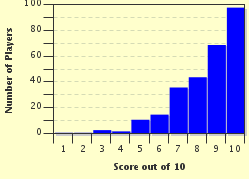Quiz Answer Key and Fun Facts
1. Oh dear, Johnny Green did a very cruel thing when he put a cat into a well, but, fortunately, a kind lad came to the rescue and pulled her out. Who was this helpful boy?
2. A fantastic feat was performed by a cow when she jumped over the moon - and without the aid of a space suit!
What did a little dog do when he witnessed this marvellous antic?
3. A creature, usually drawn in illustrations as being egg-shaped, sat on a wall. When he fell off, the king's horses and the king's men became involved. What happened next?
4. A husband and his wife were able to practice a good economy with their eating habits. One of them was unable to eat fatty foods and the other rejected all the lean ones, and so, between the two of them, nothing was wasted.
According to the nursery rhyme, who were they?
5. When a shepherdess had lost her sheep and was looking everywhere to find them, she was advised to leave them alone because they would come home on their own. She was told to expect that the sheep would be bringing some things along behind them. - What were these things?
6. What creature prevented Little Miss Muffet from eating her curds and whey? It frightened her away when it came and sat down beside her.
7. What was the little pet that accompanied Mary wherever she went?
8. Tom, the son of a piper, stole an animal, perhaps to provide food for his family. After receiving a beating as a punishment for his theft, he went howling down the street.
What animal did Tom steal?
9. A simple young man thought he could get something for nothing when, on his way to the fair, he asked a pedlar for a pie. The pieman wanted to see his money but the
simple young man said he hadn't any. It is not known if the pie man handed over a pie or not.
What was the name of this simple, silly, young man?
10. What is the missing date in the following, very-famous rhyme?
'Remember, remember the ___ of November:
Gunpowder, treason and plot.
I see no reason why gunpowder, treason
Should ever be forgot!'
Source: Author
Jomarion
This quiz was reviewed by FunTrivia editor
agony before going online.
Any errors found in FunTrivia content are routinely corrected through our feedback system.

